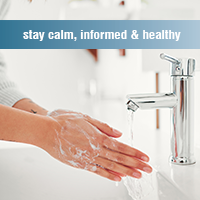With the inevitable spread of COVID-19, the illness caused by the novel coronavirus, Catholic Medical Center (CMC) is urging the public to become familiar with current recommendations on when and how to seek care as well as what to expect from their healthcare providers.
“This is a rapidly developing situation,” said CMC President & CEO Joseph Pepe, MD, “but we know that staying calm and informed can help us, as a community, to control the spread of this virus.”

New Hampshire healthcare organizations are in constant communication with the New Hampshire Department of Health and Human Services (NHDHHS) and are following the screening and treatment protocol set by the U.S. Centers for Disease Control (CDC).
“We want to highlight the most crucial information for patients,” notes Dr. Pepe, “so that they know when and how to seek care if they believe they have been exposed to COVID-19.”
People who are at highest risk for contracting COVID-19 are those who have traveled, or been in close contact with someone who as traveled, to a country under a CDC travel advisory. The highest risk countries are listed as “Level 3” countries and include China, South Korea, Iran, and Italy. If you meet the travel criteria and have symptoms such as fever, coughing, shortness of breath or difficulty breathing, call your primary care provider’s office. They will ask you details about your symptoms and travel history. Based on your answers they may consult NHDHHS about testing.
In New Hampshire, test samples are currently taken at local hospitals and sent to the state for analysis. Tests with positive results at the state lab are sent to the CDC for confirmation. If you are sent for testing, you will likely be provided with a mask on arrival at the hospital and placed in a room or area away from other patients. The providers working with you will also wear personal protective equipment. These measures are to help protect you, healthcare providers, and other patients. Once your test sample is taken, you will be sent to isolate at home for up to 14 days, unless you are in need of a higher level of care.
If you do not meet the travel criteria and do not have symptoms, you will not be tested for COVID-19. Please do not go to the hospital and ask to be tested unless you are directed to do so by the NH DHHS. Your provider may still want to see you and evaluate your symptoms for other respiratory illness, such as the flu. If you have traveled to a country under advisory but do not have any symptoms, you are encouraged to closely monitor your health for 14 days. Keep in mind that these guidelines may change and updates are posted regularly to the CDC and NHDHHS websites.
It is important to note that those who will be most negatively affected by COVID-19 are the same populations who are most prone to complications from the flu—those with underlying, chronic health conditions. Most people who contract the virus will only experience mild illness. Anyone with severe symptoms, especially those that happen suddenly, like a high fever, severe coughing or extreme difficulty breathing should seek immediate emergency care.
“With everyone, exposed or not, flu or COVID-19, the same guidance holds true,” says CMC Director of Infection Prevention Ashley Conley. “Practice great hand hygiene, avoid touching your face with unclean hands, and stay home when you’re sick.” Additionally, use extra precaution when interacting with people who are sick and do not use a mask unless you are the one experiencing symptoms.